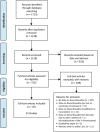Why do patients discontinue fertility treatment? A systematic review of reasons and predictors of discontinuation in fertility treatment
- PMID: 22869759
- PMCID: PMC3461967
- DOI: 10.1093/humupd/dms031
Why do patients discontinue fertility treatment? A systematic review of reasons and predictors of discontinuation in fertility treatment
Abstract
BACKGROUND Chances of achieving parenthood are high for couples who undergo fertility treatment. However, many choose to discontinue before conceiving. A systematic review was conducted to investigate patients' stated reasons for and predictors of discontinuation at five fertility treatment stages. METHODS Six databases were systematically searched. Search-terms referred to fertility treatment and discontinuation. Studies reporting on patients' stated reasons for or predictors of treatment discontinuation were included. A list of all reasons for discontinuation presented in each study was made, different categories of reasons were defined and the percentage of selections of each category was calculated. For each predictor, it was noted how many studies investigated it and how many found a positive and/or negative association with discontinuation. RESULTS The review included 22 studies that sampled 21 453 patients from eight countries. The most selected reasons for discontinuation were: postponement of treatment (39.18%, postponement of treatment or unknown 19.17%), physical and psychological burden (19.07%, psychological burden 14%, physical burden 6.32%), relational and personal problems (16.67%, personal reasons 9.27%, relational problems 8.83%), treatment rejection (13.23%) and organizational (11.68%) and clinic (7.71%) problems. Some reasons were common across stages (e.g. psychological burden). Others were stage-specific (e.g. treatment rejection during workup). None of the predictors reported were consistently associated with discontinuation. CONCLUSIONS Much longitudinal and theory led research is required to explain discontinuation. Meanwhile, treatment burden should be addressed by better care organization and support for patients. Patients should be well informed, have the opportunity to discuss values and worries about treatment and receive advice to decide about continuing treatment.
Figures


Similar articles
-
Home treatment for mental health problems: a systematic review.Health Technol Assess. 2001;5(15):1-139. doi: 10.3310/hta5150. Health Technol Assess. 2001. PMID: 11532236
-
Psychological and educational interventions for subfertile men and women.Cochrane Database Syst Rev. 2016 Mar 31;3(3):CD011034. doi: 10.1002/14651858.CD011034.pub2. Cochrane Database Syst Rev. 2016. PMID: 27031818 Free PMC article.
-
Long-term adjustment to unmet parenthood goals following ART: a systematic review and meta-analysis.Hum Reprod Update. 2017 May 1;23(3):322-337. doi: 10.1093/humupd/dmx001. Hum Reprod Update. 2017. PMID: 28164236
-
Health professionals' experience of teamwork education in acute hospital settings: a systematic review of qualitative literature.JBI Database System Rev Implement Rep. 2016 Apr;14(4):96-137. doi: 10.11124/JBISRIR-2016-1843. JBI Database System Rev Implement Rep. 2016. PMID: 27532314
-
The experience of adults who choose watchful waiting or active surveillance as an approach to medical treatment: a qualitative systematic review.JBI Database System Rev Implement Rep. 2016 Feb;14(2):174-255. doi: 10.11124/jbisrir-2016-2270. JBI Database System Rev Implement Rep. 2016. PMID: 27536798
Cited by
-
Cumulative Live Birth Rates in Low Prognosis Patients According to the POSEIDON Criteria: An Analysis of 26,697 Cycles of in vitro Fertilization/Intracytoplasmic Sperm Injection.Front Endocrinol (Lausanne). 2019 Sep 19;10:642. doi: 10.3389/fendo.2019.00642. eCollection 2019. Front Endocrinol (Lausanne). 2019. PMID: 31608011 Free PMC article.
-
Future Fertility of Patients With No Embryo Transfer in Their First IVF Cycle Attempts.Front Endocrinol (Lausanne). 2022 Jul 27;13:893506. doi: 10.3389/fendo.2022.893506. eCollection 2022. Front Endocrinol (Lausanne). 2022. PMID: 35966059 Free PMC article.
-
Mild stimulation approach for In Vitro Fertilization treatment: Retrospective data from one Danish Centre.Facts Views Vis Obgyn. 2018 Jun;10(2):81-84. Facts Views Vis Obgyn. 2018. PMID: 31110646 Free PMC article.
-
Women's Reports of Barriers to and Facilitators of Oral Medication Adherence During Ovarian Stimulation: A Mixed Methods Pilot Study.J Reprod Infertil. 2021 Jul-Sep;22(3):184-200. doi: 10.18502/jri.v22i3.6719. J Reprod Infertil. 2021. PMID: 34900639 Free PMC article.
-
Misunderstandings in ART Triadic Interactions: A Qualitative Comparison of First and Follow-Up Visits.Front Psychol. 2021 Jun 10;12:641998. doi: 10.3389/fpsyg.2021.641998. eCollection 2021. Front Psychol. 2021. PMID: 34177696 Free PMC article.
References
-
- Ajzen I, Fishbein M. Understanding Attitudes and Predicting Social Behaviour. Englewood Cliffs, NJ: Prentice-Hall; 1980. doi:10.1111/j.1365-2044.1949.tb05837.x. - DOI
-
- Akyuz A, Sever N. Reasons for infertile couples to discontinue in vitro fertilization (IVF) treatment. J Reprod Infant Psychol. 2009;27:258–268. doi:10.1056/NEJM197710202971601. - DOI
-
- Anderson CJ. The psychology of doing nothing: forms of decision avoidance results from reason and emotion. Psychol Bull. 2003;129:139–167. doi:10.1213/01/ane.0000309024.28586.70. - DOI - PubMed
-
- Beck AT, Beamesderfer A. Assessment of depression: the depression inventory. Pharmacopsychiatria. 1976;7:151–169. doi:10.1378/chest.104.3.701. - DOI - PubMed
-
- Boden J. When IVF treatment fails. Hum Fertil. 2007;10:93–98. - PubMed

